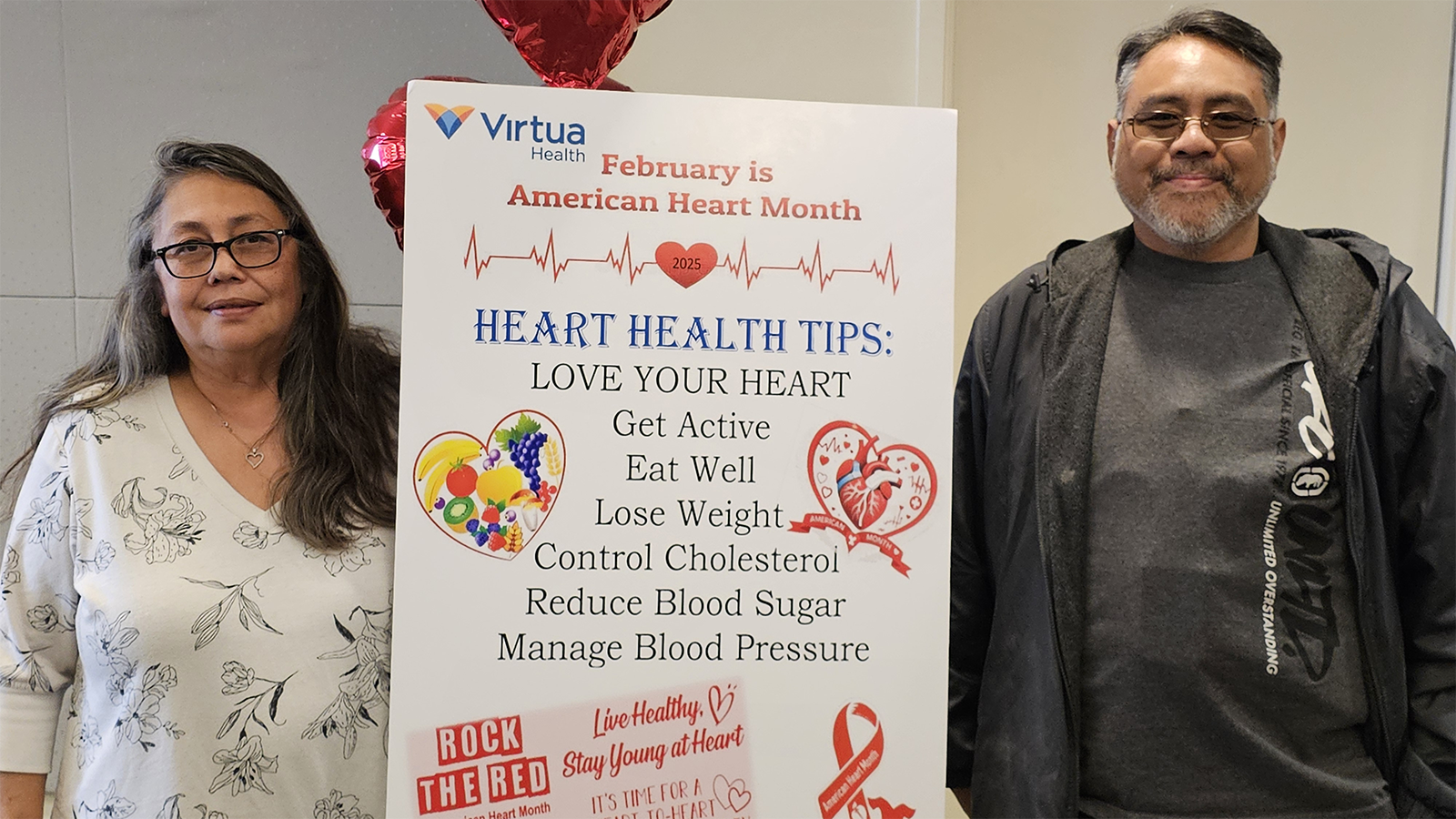4 Reasons Why Heart Patients Should Follow COVID 19 Safety Guidelines
If you have heart disease, you should be extra vigilant in following COVID-19 prevention guidelines.
By Hafeza Shaikh, DO, FACC, RPVI, FACOI, Cardiologist—Virtua Cardiology
Cases of the coronavirus, COVID-19, are increasing and people with heart disease seem to be especially vulnerable. If you have a heart disease diagnosis, you should be extra vigilant in following Centers for Disease Control and Prevention guidelines.
Based on the information we’re receiving, many of the patients who become severely ill from the virus have underlying conditions such as hypertension, coronary artery disease or heart failure.
Here are four reasons why:
First and foremost, people who are older or have a heart condition may have a weakened immune system, so the body’s response to the virus may not be as strong. People who have cancer, lung disease, or diabetes, take medication that suppresses the immune system, or had an organ transplant also are at additional risk.
Second, COVID-19, like the flu, is a respiratory illness targeting the lungs. Respiratory illnesses also affect the heart, which has to work harder to deliver oxygen-rich blood throughout the body. For someone with congestive heart failure, whose heart is already having problems pumping efficiently, this can significantly worsen symptoms and lead to complications.
Third, COVID-19 may pose a particular danger to the heart because of how the virus attacks the body’s cells. The virus latches onto a protein called angiotensin-converting enzyme 2, or ACE2. ACE2 is found on cells in the lungs, heart and inner lining of the blood vessels. Doctors in China found some people with COVID-19 suffered myocardial injury, the death of heart cells for reasons other than a heart attack. If your heart is already damaged from a heart attack or other condition, you could develop heart failure.
ACE2 also is part of a system of hormones that regulate blood pressure and cardiovascular and kidney function. One-third of Americans have high blood pressure, with millions taking medicines to control it. The virus may interfere with how well those medicines work.
Finally, COVID-19 poses a risk for people with atherosclerosis, the build-up of fats, cholesterol, and other substances (known as plaque) inside the arteries. Inflammation, the body’s normal response to infection, can destabilize the plaque, potentially resulting in the blockage of an artery and a heart attack.
To help reduce your risk:
- Follow social distancing guidelines. That means:
- Obey state stay-at-home orders.
- When in the community, stay at least 6 feet away from others.
- Use Skype, FaceTime or other video apps to stay in touch with family and friends.
- Avoid close contact with people who are sick.
- Wash your hands often with soap and water for at least 20 seconds, especially after going to the bathroom; before eating; and after blowing your nose, coughing, or sneezing.
- If soap and water are not available, use a hand sanitizer with at least 60 percent alcohol. Always use soap and water if your hands are visibly dirty.
- Avoid touching your eyes, nose, and mouth.
- Cover your cough or sneeze with a tissue, then throw it in the trash.
- Clean and disinfect frequently touched objects and surfaces with a household disinfectant.
- Maintain healthy habits, like eating well, getting enough sleep, and managing your stress levels.
- Do not stop any medication unless directed by your doctor.
There's So Much More to Explore
Discover expert insights, inspiring stories, health tips, and more by exploring the content below!

Are You Eating Too Much Salt? High-Sodium Foods to Watch For

4 Exercise Tips to Help You Reverse High Blood Pressure

Timely Heart Care During a Heart Attack Helps Joe Feed the Community

3 Reasons Why Now's the Time to Find Relief From Varicose Veins

HeartTalk Magazine

Lifesaving Heart Care Creates a 'Bond That's Never Left Us'

How High Blood Pressure Affects Your Body

5 Interesting Facts About Your Heart

Get to the Bottom of Blood Pressure Numbers

CABG Surgery: What Women Should Know About Heart Health and Healing

When to Take Action for a Stronger Heart

Groundbreaking Renal Denervation Procedure Controls a Lifetime of High Blood Pressure

Patient Story: LVAD Mechanical Pump Strengthens Michael's Heart Function

Mitral Valve Surgery Keeps Yaneth Living the American Dream
Inside Look at Blood Vessels Aids PAD Treatment
Denise Davis: Pay Attention to Your Heart Health

Sweet Music: Trust, Teamwork Save Justin from Heart Attack

Complex Heart Surgery Nets James a Lifelong Friend

8 Key Steps to Better Blood Pressure Control

Signs You Should Get Treated For Vein Problems

One New Heart Valve Saves Two Lives in the Tritten Family

What You Need to Know About Heart Failure

6 Numbers Key to Keeping Your Heart Healthy

Five Mindfulness Tips That Can Help Heal Your Heart

Watchman Heart Device: a Technological Breakthrough for Blood Clot Prevention

Albert's Emergency Cardiac Surgery Is a 'Story of a Lifetime'

Love Your Heart: Essential Care Tips for Every Stage of Life

How Do I Measure My Blood Pressure at Home?

How Do I Improve My Cholesterol Levels?

3 Ways to Reduce Your Stroke Risk

How the Unique Stages of a Womans Heart Affect Her Health

Can Your Gut Health Affect Your Heart?
Advanced Heart Failure Therapies Get Bernadine Back to Full Speed

Keeping the Beat: Advanced Heart Surgery for Aortic Aneurysm

Heart-Healthy Summer Recipe: Hummus and Veggies

4 Delicious Heart-Healthy Recipes Perfect for Summer

Heart Healthy Summer Recipe: Dessert Parfait

Heart-Healthy Summer Recipe: Pear and Walnut Salad

Heart-Healthy Summer Recipe: Terrific Turkey Burgers
Atrial Fibrillation and Stroke: What's the Connection?
Heart Tests Your Doctor May Order
Managing Pregnancy for Mothers With Heart Conditions

Heart Healthy Recipe: Basil Pesto Pasta With Seared Vegetables

Heart Healthy Recipe Chocolate Avocado Chia Pudding
Keep Your Heart Rhythm in Check With Your Smartwatch
Mind Your Meds for Blood Pressure Risks
Magic Pill for Heart Health? Cut 300 Calories a Day
3 Smart Ways to Boost Your Heart Health
3 Best Exercises For Heart Health

Get Your Heart Pumping With These 25 Workout Songs
Your Chest Pain: Heartburn, Heart Attack, or Something Else?
3 Heart Healthy Recipes to Win Valentines Day
How Work and Home Stress Can Affect You
Why Improving Your Health Is Going To The Dogs And Cats
Why Younger Women Need Start NOW To Safeguard Their Hearts From Heart Attacks
Can You Die of a Broken Heart?
Mitral Valve Surgery Opens Doors for Improved Quality of Life
6 Healthy Habits to Start in Your 20s for Better Lifelong Health
Do You Have a Fatty Heart?
Get Pumped! Assist Devices Can Improve Heart Failure Symptoms
A Cardiologists Advice on Heart-saving Emergency Cardiac Care
Virtua Doctor’s Experience Is a Warning for All About COVID-19 and Strokes
You May Feel Fine, but Gregory Says "Don't Skip Your Medical Care"
In Sickness and in Health: Couples Often Share Heart Disease Risk
"Reduce Your Heart Disease Risk With a Plant-based Diet"
Hybrid Robotic Heart Surgery and Valve Replacement Restores Quality of Life
Can Marijuana Hurt Your Heart Health?
6 Tips for Restoring Your Heart Rhythm
Eat Smart for Your Heart
Cardiac Rehab: Strengthening Your Heart After Leaving the Hospital
Your Heart Needs A Good Nights Sleep
Are You at Risk for AAA—the Silent Killer?
The Cardio Oncology Team Protects Your Heart During Cancer Treatment
Get Relief From Painful Varicose Veins This Summer
Exercise Your Way to a Stronger Heart
Fish Oil: A Good Catch or a Scam?
My Heart Seems to Skip a Beat - Should I Be Worried?
Menu Planning? Try These 5 Heart-smart Substitutions

5 Health Risks Tied to Weight

